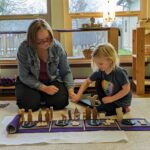A Word about That
There is a lot in the news about Bill O’Reilly and the growing allegations of sexual harassment against him. For those who do not, nor ever have, liked his show, there is a sense of celebration now that he is gone from the Fox channel. For those who do, and always have, liked his show, there is a rush to defend him and to blame or shame those bringing allegations against him.
Let me first say that in the words of 1 Corinthians 13:6 “love does not rejoice in wrongdoing, but rejoices in the truth.” However you feel about Bill O’Reilly or those who bring accusations against him, your first order as a Jesus follower is to love and to not rejoice at any wrongdoing in this case, but to search for and rejoice in truth.
That being said, I also want to share with you a little bit about a little talked about subject in church and that is sexual violence. Sexual violence is not new in the Judaeo-Christian tradition–Our Bible contains stories of a society in which women were valued less than men…a society in which women were enslaved as concubines and bore children on behalf of their masters…a society in which rape was condoned. The sexual violence is there and often we do not know what to do with it or how to talk about, so we simply don’t.
In our tradition, we seek to read and study Scripture with an understanding of context, history and societal structures. We seek to discern how God worked in those contexts and calls us beyond them. We seek to discern how God works in and call us beyond our own context. Slavery is not good. Owning concubines and forcing them to bear children is not good. Relegating lepers and the sick to the fringes of society is not good. Rape is not good.
As Christians we follow Jesus who ministered into these situations and brought dignity to the least of these, even (and especially) when it was not afforded by religion or society.
Sexual violence is not new, but if you are tempted to share an opinion about it (especially in light of the O’Reilly story), please consider these statistics and a few words I have would like to share with you about them:
*According to RAINN (Rape, Abuse, Incest National Network), 1 out of every 6 American women has been the victim of an attempted or a completed rape in her lifetime.
*Also according to RAINN, 1 out of every 33 American men has been the victim of an attempted or a complete rape in his lifetime.
*According to the National Sexual Violence Resource Center, in 8 out of 10 cases of rape, the victim knew the person who sexually assaulted them.
*Also according to the National Sexual Violence Resource Center, rape is the most under-reported crime with 63% of sexual assaults not being reported to police.
*According to a 2015 Cosmopolitan Survey, 1 in 3 women has been sexually harassed at work. 71 % of these women did not report the harassment.
*The American Association of University Women defines workplace sexual harassment as any unwelcome sexual advances, requests for sexual favors, or other verbal or physical conduct of a sexual nature.
Why do people not report harassment or assault? There are many reasons people don’t report, but perhaps one of the most influential is that the perpetrator is so often known to the victim. The perpetrator may hold more power than the victim–they may be a boss, a teacher, a landlord. The perpetrator may be a family friend or a family member and the victim feels a real sense of fear and anxiety about outing the person or potential retaliation from the person. The victim may have fears that they will not be believed.
There are lots of reasons people don’t report harassment or assault. What I want you, dear Christians, to consider is that when you are in your houses of worship, or your halls of fellowship, or your small groups or Bible studies, that there is more than likely someone among you who has experienced sexual harassment or sexual assault. So choose your words wisely, compassionately or (better yet) keep your words to yourself if they are not words that afford the kind of dignity that Jesus affords to all.
If you have experienced sexual harassment or sexual violence, know that the church seeks to be a place of sanctuary and refuge. Know that there are people who want to listen and to help–the National Sexual Assault Hotline is 800-656-HOPE. Know that there are people like Maya Angelou, who have come through the trauma of sexual violence and have words of hope and healing to share with you. Know that there are artists like Sara Jane who, through her project Mere Objects: Participatory Art Honoring Survivors of Sexual Violence, seek to bring healing through art. Know that you are not alone.




